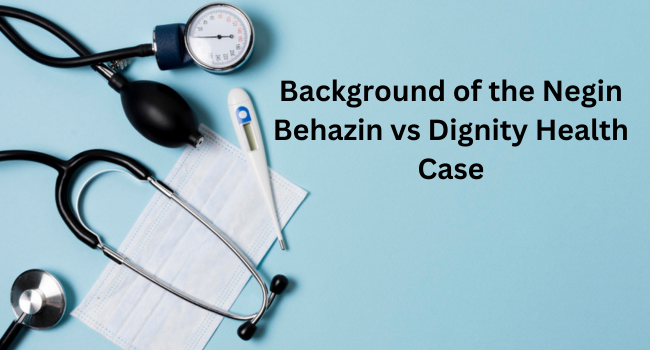Introduction
The case of Negin Behazin vs Dignity Health has drawn a lot of attention in the area of legal disputes and court battles. A high-profile legal dispute between a person and a well-known healthcare organization has substantial implications for patient rights, medical ethics, and healthcare providers’ obligations. In this essay, we will examine the background, major issues, and potential repercussions for the healthcare sector of the Negin Behazin vs Dignity Health case in depth.
Background of the Negin Behazin vs Dignity Health Case

In the Negin Behazin vs Dignity Health lawsuit, medical malpractice and discrimination are alleged to have occurred. A transgender woman named Negin Behazin sued Dignity Health, a sizable healthcare network that runs hospitals and clinics all over the country. Behazin was allegedly denied essential medical care because of discrimination by Dignity Health based on her gender identity.
Allegations of Discrimination and Medical Negligence

Behazin claims that because Dignity Health is linked with the Catholic Church, they declined to perform the hysterectomy that her medical professionals determined was required for her gender transition. According to reports, the denial was justified by religious rules that forbid some surgeries that are thought to be against Catholic doctrine, even if they are vital for the patient’s health.
Behazin claims that Dignity Health is discriminating against her because of her gender identification by refusing to give her the necessary medical care. The case presents significant issues about the harmony between patient rights and religious freedom, particularly when religious beliefs are at odds with accepted medical procedures.
Legal Arguments and Implications
Legal ramifications for the Negin Behazin vs Dignity Health case are substantial. Behazin’s legal team claims that Dignity Health broke California’s Unruh Civil Rights Act, which forbids discrimination based on gender identity and sexual orientation, by refusing her essential medical care due to her gender identity.
The case also highlights the tension between medical ethics and religious beliefs. Religious organizations have the freedom to practice their beliefs, but should they be excused from giving patients access to medical care that is considered required by medical experts? The verdict, in this case, could establish a standard for similar conflicts in the future and have significant repercussions for the healthcare sector.
The Public Response and Advocacy

Discussions over transgender rights, healthcare access, and the confluence of religious views and medical treatment have been generated by the Negin Behazin vs Dignity Health case, which has drawn considerable public interest. Behazin has received support from advocacy groups and LGBTQ+ organizations, who also stressed the significance of upholding transgender people’s rights and ensuring that they have equal access to medical care.
On the other hand, some contend that religious organizations should be free to adhere to their faith’s teachings, even if doing so means refusing to perform specific medical operations. They argue that people can seek care elsewhere if they run into such issues and that religious organizations shouldn’t be forced to go against their moral code.
Possible Outcomes and Future Implications
At the time of writing, it is still unclear how the Negin Behazin vs Dignity Health lawsuit will turn out. However, the court’s ruling will unquestionably have a significant impact on the healthcare sector and transgender people’s rights.
If the court wins in Behazin’s favor, it might set a legal precedent stating that healthcare facilities with a religious affiliation are required to offer essential medical care without discrimination on the basis of gender identity. This result would probably have a cascading effect, causing other healthcare organizations to reassess their policies and perhaps alter practices that forbid specific procedures because of religious views. It would also convey a powerful message about defending the rights of transgender people and making sure they have access to quality medical care.
However, if the court wins in Dignity Health’s favor, it may establish a different precedent, highlighting the ability of healthcare organizations with religious ties to adhere to their religious principles even when they disagree with accepted medical practices. LGBTQ+ communities and advocacy organizations may be concerned about this decision because they worry that it may jeopardize transgender people’s rights and access to healthcare.
No matter how the court rules, the Negin Behazin vs Dignity Health case has highlighted the need for more precise rules and regulations governing the confluence of religious beliefs and medical care. It has spurred crucial discussions about finding a balance between patient rights and religious freedom as well as the duty of healthcare institutions to provide impartial and equal care to all people.
The Importance of Patient-Centered Care

The importance of patient-centered care and the ethical responsibilities of healthcare professionals are both highlighted by the Negin Behazin vs Dignity Health case. Regardless of their gender identity or the place of worship where the healthcare facility they seek care is located, every patient has the right to get the necessary and appropriate medical care.
Respecting human autonomy, preserving moral principles, and ensuring non-discriminatory practices within the healthcare system are all important components of patient-centered care. It demands that healthcare workers navigate potential conflicts between religious convictions and medical best practices while placing the interests and well-being of their patients above all else.
The Need for Legislative Action
The Negin Behazin vs Dignity Health case emphasizes the requirement for legislative action to deal with the difficulties brought on by the confluence of religious beliefs and healthcare. Although it is a basic right, religious freedom should not be used as an excuse to withhold essential medical care or treat people differently based on their gender identity.
A framework that respects both patient rights and religious freedom can be established with the support of clearer regulations and laws. Striking a balance that guarantees people have access to proper medical care while honoring the religious practices and beliefs of healthcare organizations is crucial. The foundation of any legislation should be fairness, equality, and nondiscrimination.
Conclusion
The difficulties and moral conundrums encountered at the nexus of religious beliefs and healthcare have received substantial attention as a result of the Negin Behazin vs Dignity Health case. The rights of patients, medical ethics, and healthcare providers’ obligations are all raised as crucial issues by this. The outcome of this lawsuit will have significant ramifications for the healthcare sector and transgender people’s rights.
Finding solutions that protect religious freedom while guaranteeing fair access to healthcare services for everyone is essential as society continues to change. To traverse these complicated concerns and develop a healthcare system that provides patient-centred treatment without discrimination, advocacy groups, religious institutions, and healthcare professionals must engage in constant discourse and engage in legislative action.
Frequently Asked Questions (FAQs) – Negin Behazin vs Dignity Health Case
Q1: What is the Negin Behazin vs Dignity Health case?
A transgender woman named Negin Behazin and Dignity Health, a hospital with a Catholic affiliation, are parties to a prominent legal dispute known as the Negin Behazin vs Dignity Health case. By refusing to perform the necessary hysterectomy as part of her gender change, Behazin claims that Dignity Health discriminated against her based on her gender identification.
Q2: What are the key issues in the Negin Behazin vs Dignity Health case?
Allegations of prejudice and medical malpractice are at the center of the case. Behazin alleges that Dignity Health’s refusal to provide her with essential medical care because of religious restrictions violated her rights and amounted to gender identity discrimination.
Q3: What are the legal arguments presented in this case?
Behazin’s legal team contends that Dignity Health’s conduct was against the Unruh Civil Rights Act of California, which forbids discrimination on the basis of sexual orientation and gender identity. The case highlights more general legal issues on how to strike a balance between patient rights and religious freedom as well as the duties of healthcare professionals.
Q4: What are the potential implications of the Negin Behazin vs Dignity Health case?
The court’s ruling, in this case, may serve as a model for other cases involving the confluence of religious beliefs and medical treatment. The healthcare sector, transgender rights, and people’s rights to get necessary medical treatments without prejudice may all be significantly impacted.
Q5: How has the public responded to this case?
Discussions concerning transgender rights, access to healthcare, and how to strike a balance between religious convictions and medical ethics have been raised by the Negin Behazin vs Dignity Health case, which has attracted widespread attention. Support for Behazin has come from advocacy groups and LGBTQ+ organizations, who stress the value of providing transgender people with equitable access to healthcare treatments.
Q6: What are the possible outcomes of this case?
The court might decide in Behazin’s favor, reiterating the necessity of religiously linked healthcare organizations offering essential medical care without prejudice. Alternatively, the court might decide in Dignity Health’s favor, highlighting the right of religious organizations to follow their faith-based precepts. The result will have an impact on patient rights and the medical field.
Q7: What does this case highlight about patient-centred care?
The Negin Behazin vs Dignity Health case serves as a reminder of the value of patient-centered care, which places a premium on respect for each person’s autonomy, moral responsibility, and non-discriminatory behavior in the healthcare industry. It emphasizes how important it is for medical professionals to protect patients’ rights and well-being while managing any potential conflicts between patients’ religious views and accepted medical procedures.
Q8: Is legislative action needed to address these issues?
Yes, legislative action is necessary to address the challenges brought about by the interaction between religious beliefs and healthcare. In order to provide equal access to healthcare services while respecting the beliefs and practices of healthcare organizations, clearer regulations and legislation can help create a framework that protects both patient rights and the right to freedom of religion.
Q9: How can society create a more inclusive healthcare system?
It takes constant communication and cooperation between medical experts, religious institutions, and advocacy groups to develop a healthcare system that is more inclusive. It entails coming up with solutions that protect religious liberty while guaranteeing that everyone, regardless of gender identity or religious views, has equitable access to healthcare services.
Q10: What is the takeaway from the Negin Behazin vs Dignity Health case?
The Negin Behazin vs Dignity Health case is a potent reminder of the persistent difficulties and moral conundrums that arise when religious beliefs and medical care are combined. It emphasizes the requirement for a healthcare system that offers patient-centered treatment, respects individual autonomy, and supports the rights of every patient, regardless of their gender identity or place of religious observance.
The situation emphasizes the value of continued initiatives to establish a compromise between patient rights and religious freedom, ensuring that essential medical care is delivered without discrimination. To establish more precise norms and laws that support fairness, equality, and non-discrimination within the healthcare industry, it asks for legislative action as well as ongoing discussion among stakeholders.










